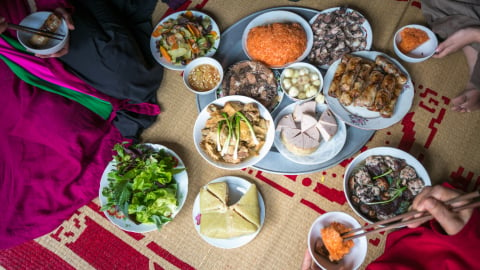Asian cuisine has transcended its role as a mere source of nutrition to become a complex belief system, carrying profound messages about community values, hope for a bright future, ways to ward off misfortune, and even a remedy for longevity.
Japan
Japanese culinary culture is home to many interesting beliefs stemming from wordplay, specifically homophones, which create unique rules of etiquette. A prime example is the pear. In Japanese, the word "nashi" (梨 - pear) sounds exactly like "nashi" (無 - nothing, emptiness). Therefore, traditionally, giving pears as gifts, especially to the sick, is considered bad luck, implying a wish for the recipient to go to the "world of nothingness."

In their culture, the Japanese generally avoid giving pears as a gift.
Conversely, octopus is considered a lucky snack for students. The word "tako" (octopus) evokes the word "taku" (to hold, to grasp). Therefore, before important exams or tests, students often eat octopus with the belief that it will help them "hold onto knowledge" in their minds, thus performing better on the test. Although this belief is somewhat exaggerated, this dish has indeed helped reduce stress for students during the stressful exam period.

Using wordplay, it later became a Japanese custom to bring good luck by eating squid.
China
As a nation with a billion people and a long history, China possesses deeply influential culinary beliefs intertwined with community life and funerals. Most famous is the longevity noodle dish, a national staple and indispensable for birthdays. This tradition dates back to the Han Dynasty, when the extremely long noodles were considered a symbol of enduring and uninterrupted vitality. Therefore, the noodles must never be cut short, as the Chinese believe that doing so is an ill omen, associated with shortening one's lifespan.

The Chinese concept of "longevity noodles" (長壽麵) revolves around the symbolic meaning of the long, uncut noodles, representing longevity, good fortune, and good health.
Another strict rule is never to stick chopsticks upright in a bowl of rice. Locals believe this image resembles incense sticks lit at funerals or in ancestral altars. The act of sticking chopsticks upright in a bowl of rice is seen as a metaphor for death, so Chinese parents strictly forbid their children from doing this from a young age.

As an Asian country, Chinese dining tables often have many strict customs.
Furthermore, for tourists, flipping a fish while eating is considered a bad omen, especially for those who work on the river. According to folklore, a flipped fish symbolizes an overturned boat, an extremely unlucky image, especially for those about to set sail.
Korea
Similar to Japan, Korean students also have a lucky snack before exams: "Chapssal-tteok," a traditional skewered rice cake. With its characteristic sticky texture, this cake is believed to help knowledge "stick to the brain" for better exam performance. Furthermore, thanks to its sticky texture and sweet taste, this cake is also a symbol of longevity and prosperity at weddings, birthdays, and housewarmings, representing strong bonds that are not easily broken.

In Korea, the concept of "bringing good luck" with Chapssal-tteok (찹쌀떡) means giving it to students about to take important exams as a wish for good luck and success.

Philippines
In the Philippines, rice is not only an important culinary ingredient but also associated with beliefs about good fortune. People believe that wasting even a single grain of rice will bring bad luck, such as poverty or even misfortune regarding a future spouse.
In particular, on New Year's Eve, Filipinos often use 12 round fruits as offerings, each symbolizing a month of the year, wishing for a prosperous and fulfilling new year. Additionally, consuming sticky rice desserts like "suman" and "biko" on New Year's Eve also signifies good fortune and the hope for harmonious relationships in the new year.

A dessert made with sticky rice is called suman.
Thailand
Thai culinary beliefs are often linked to Buddhism, agriculture, and traditional lifestyles. Thai people believe that coconuts symbolize protection and good fortune. Therefore, before exams, Thai students often drink sweet coconut water or eat the dessert "ma-phrao" (pronounced similarly to the Thai phrase "not too bad") to achieve good results. Some families even have the custom of breaking a coconut before moving into a new house to ward off evil spirits and welcome prosperity and abundance.

Another popular belief is the rule of cracking eggshells and not letting the two halves stick together. According to folklore, leaving the two halves of an eggshell stuck together resembles an overturned boat, bringing bad luck to fishermen. Many families separate the eggshells to show respect to their ancestors who once ventured across rivers and seas.
Vietnam
In Vietnam, culinary beliefs focus on avoiding certain foods to bring good luck, especially at important times such as the beginning of the month, the beginning of the year, or before major occasions. The most strictly forbidden foods include dog meat, duck, goose, and squid. Eating dog meat at the beginning of the month is believed to bring bad luck, causing work to go poorly, while duck meat is avoided due to the fear of family disintegration (especially common in Central Vietnam).

Although these beliefs are merely folk traditions passed down orally, they play a core role in Vietnamese culture, reflecting the desire for good fortune and prosperity.
Furthermore, many people avoid eating fertilized duck eggs (for fear of disruption in all endeavors), shrimp (for fear of going backward), carp (for fear of bad luck), and bananas (for fear of "slipping on a banana peel" during exams). These beliefs, though passed down through word of mouth, remain an integral part of Vietnamese folk culture, reflecting the deep-seated desire of Vietnamese people for good fortune and success in life.

 VI
VI EN
EN





























